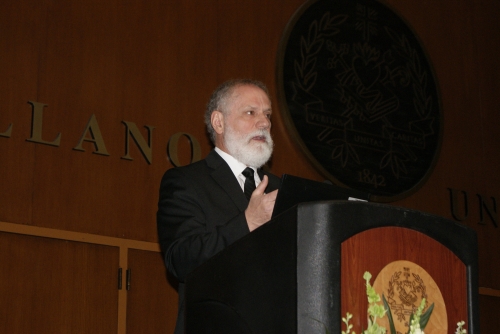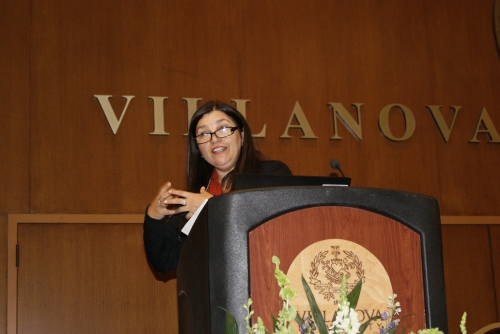Toward a healthier world

Keynote speaker Dr. Louis Hugo Francescutti argued that the health care system must move from a more reactionary approach of responding to sickness and instead focus on proactive efforts to achieve a healthy population.
Hundreds of people from all over the globe celebrated the College of Nursing’s 60th anniversary on Saturday, April 6, marking the “Partners in Advancing Global Health: Educating the Next Generation” event with talks by influential leaders in global healthcare who stressed that nurses are key players in molding a dramatically changing healthcare landscape.
Standing before a crowd of students, professors, healthcare professionals, and other friends of the college, M. Louise Fitzpatrick, Ed.D., R.N., FAAN, Connelly Endowed Dean and Professor, emphasized that Villanova University’s College of Nursing is preparing students to respond to a rapidly shifting health care system and nursing profession that no longer centers solely around hospitals but includes care for an aging and increasingly multicultural population. Through undergraduate and graduate coursework and fieldwork in places across the country, and globe, Villanova students are poised to work in an increasingly complex and interconnected world, Dr. Fitzpatrick noted.
"What is nursing going to look like, and what will you undergraduates be doing?” Dr. Fitzpatrick asked during her opening remarks. “You’re probably not going to be doing a traditional nursing role in a hospital.”
Dr. Fitzpatrick proceeded to welcome the celebration’s two keynote speakers, Louis Hugo Francescutti, MD, PhD, MPH, FRCPC, FACPM, the president-elect of the Canadian Medical Association and immediate past president of the Royal College of Physicians and Surgeons of Canada, and Naeema Al-Gasseer, PhD, FAAN, the assistant regional director for the World Health Organization (WHO) Eastern Mediterranean Region and WHO representative in Egypt, both of whom addressed ideas of an evolving health care system and the role of nurses in a world where health is dictated by everything from war and environmental crises to an overabundance of fast food and exercise.
Dr. Francescutti, a professor at the University of Alberta’s School of Public Health, in his keynote address titled, “Let’s Get Rid of the Patient,” argued that the health care system must move from a more reactionary approach of responding to sickness and instead focus on proactive efforts to achieve a healthy population.
“I’ve yet to meet a patient who wants to be a patient,” Dr. Francescutti said. “I’ve yet to meet a woman with breast cancer who’s happy to be a patient... We have to challenge ourselves to think very, very differently about what we do.”
Saying “we’ve become slaves to disease,” Dr. Francescutti urged health care professionals to overhaul a system in which he said physicians “are way, way over-prescribing medication,” and individuals to rethink how to live - including staying away from smoking, fatty foods and inactivity.
“Most medicine will not give you anything near the benefit of exercising half an hour a day,” he said.
Additionally, Dr. Francescutti stressed that health care policy must revolve far more around the first two years of an individual’s life, saying that if this is achieved a whole slew of societal problems would be better addressed, from incarceration rates to health care costs.
“You either spend money on early childhood development, or you’ll spend it later” on health care, the prison system, welfare, among others.

Dr. Naeema Al-Gasseer has worked in some of the most dangerous places on earth. During her keynote, she said there needs to be a “realignment of values,” including “access to quality, people-centered care.”
Dr. Al-Gasseer, a Bahraini national who previously served as a WHO representative for Iraq and has worked on health care in such countries as Syria, Lebanon and Bahrain, focused her talk, “Building Evidence in Partnership Towards a Healthy Population in a Changing Environment” on the promotion of health being key to achieving global security - as well as on global security being a means to securing a healthier world population. Complex emergencies across the globe - such as in Afghanistan, Lebanon, Iraq, the Sudan, Somalia, result in a host of health crises - or exacerbate already existing health issues - such as hunger and such epidemics as HIV/AIDS and malaria, Dr. Al-Gasseer said.
“Today we are having many emergencies - 48 percent of the world population is living in an emergency situation,” she said. “...Are we prepared as nurses for disasters? Do we know how to handle people who’ve lost everything?”
Like Dr. Francescutti, Dr. Al-Gasseer said there needs to be a “realignment of values,” including “access to quality, people-centered care.” “There needs to be a focus on safe water and safe food,” she continued. Additionally, Dr. Al-Gasseer stressed the need for nurses, doctors and a myriad of other healthcare professionals to work together.
“Today we are no longer saying, ‘Only I can do this; I can do this research,’” she said. “We have to work with others. We should not see research being done by a few elected and elite people.”

